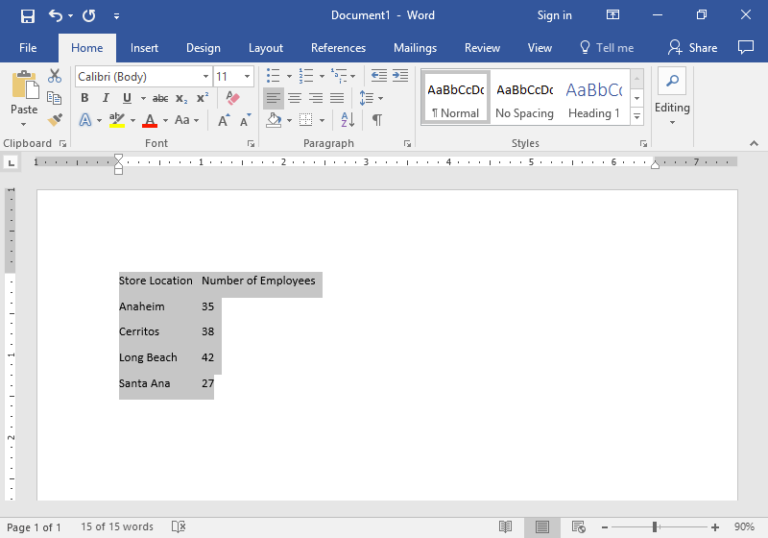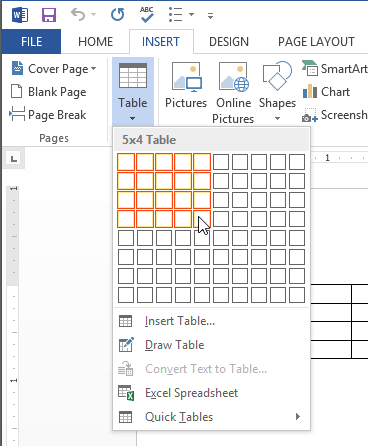

This example copies the tables from the current document into a new document. RngText.MoveEnd Unit:=wdCharacter, Count:=-1Ĭopying all tables in the active document into a new document If you have the Latex source window visible you can copy and paste the Latex markup into your tex file. You can then do tidy it up, merge cells etc. Then in the top left hand corner cell go to Edit-Paste Special-Plain Text. The For Each.Next structure is used to return the contents of each table cell and assign the text to the corresponding array element. Copy the table in Excel, should work in Word too. From there you can tell Word whether to separate the text using tab marks, paragraph marks, or some other mark. On the Layout ribbon, look in the Data cluster at the right edge and click the Convert to Text icon. The following example defines an array equal to the number of cells in the first document table (assuming Option Base 1). Or click anywhere in the table and then click the Select icon on the left edge of the (Table) Layout ribbon and click Select Table. Returning the contents of each table cell ConvertToTable Separator:=Chr(9), NumRows:=1, NumColumns:=3 InsertBefore "one" & vbTab & "two" & vbTab & "three" & vbCr The following example inserts tab-delimited text at the beginning of the active document and then converts the text to a table. RngTable.MoveEnd Unit:=wdCharacter, Count:=-1 Set rngTable = ActiveDocument.Range(Start:=, _ Sub ReturnTableText()įor Each celTable In tblOne.Rows(1).Cells The following example returns and displays the contents of each cell in the first row of the first document table. Returning text from a table cell without returning the end of cell marker With ActiveDocument.Tables(1).Cell(Row:=1, Column:=1).Range The Delete method is used to delete the existing text and the InsertAfter method inserts the "Cell 1,1" text. The Range property returns a Range object. The Cell method returns a single Cell object. The following example inserts text into the first cell of the first table in the active document. TblNew.AutoFormat Format:=wdTableFormatColorful2, _ĪpplyBorders:=True, ApplyFont:=True, Appl圜olor:=True Range:=docActive.Range(Start:=0, End:=0), NumRows:=3, _Ĭ "Cell " & intCount Within the For Each.Next structure, the InsertAfter method of the Range object is used to add text to the table cells (Cell 1, Cell 2, and so on). The For Each.Next structure is used to step through each cell in the table. The following example inserts a four-column, three-row table at the beginning of the active document.

Creating a table, inserting text, and applying formatting Under Table size, make sure the numbers match the numbers of columns and rows you want.This topic includes Visual Basic examples related to the tasks identified in the following sections. In the Convert Text to Table box, choose the options you want. Select the text that you want to convert, and then click Insert > Table > Convert Text to Table. Since the very simple text files, they are frequently used for storing data. The text file can contain both formatted and unformatted text. See this image: Next Topic To Add Row in Table. Click OK, the text will convert to a table. In Separate text at section select the desired option. Text files opposed binaries that contain data that is not intended for interpretation as a text (encoded sound or image). Select the Convert Text to Table option It displays a dialog box. How do I align text in a table in Word 2007? TXT is a file format that contains the text, organized in rows.How do you make a Paragraph in a table?.How do I change the Paragraph settings in a table?.

How do I create a table in Word step by step?.How do I make a table in Microsoft Word Mobile?.How do you change the table style in Word?.Which tab would you use to convert a text to a Table?.How do I convert text to a Table in Word 2010?.How do I insert text to the left of a table in Word?.You choose whether you want to extract from an entire.
CONVERTING TEXT TO TABLE WORD PDF
CONVERTING TEXT TO TABLE WORD MAC


 0 kommentar(er)
0 kommentar(er)
